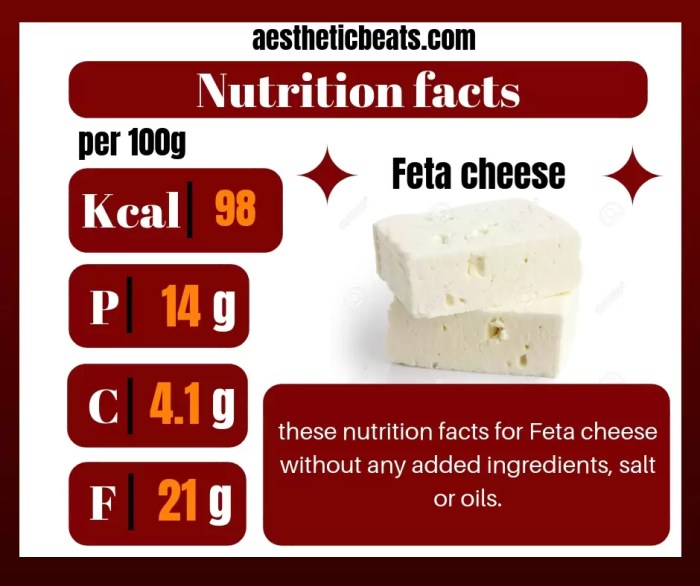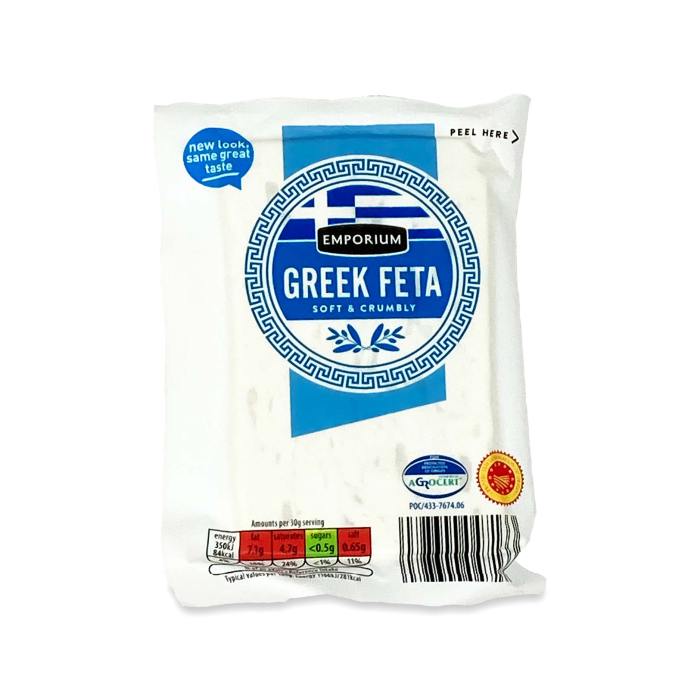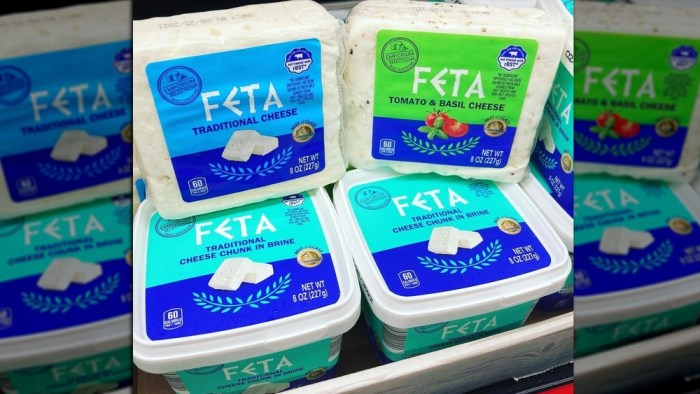Nutritional Information Comparison

Aldi feta cheese nutrition – Let’s delve into a comparison of Aldi feta cheese’s nutritional profile against other popular brands. This will help you make informed choices based on your dietary needs and preferences. Remember that nutritional values can vary slightly depending on the specific product and batch.
The following table uses a standard serving size of 1 ounce (approximately 28 grams) for all feta cheese brands to ensure a fair comparison. Keep in mind that different types of feta (e.g., full-fat versus reduced-fat) will have varying nutritional content, even within the same brand.
Nutritional Comparison Table, Aldi feta cheese nutrition
| Nutrient | Aldi Feta Cheese (Example) | Brand A Feta Cheese | Brand B Feta Cheese | Brand C Feta Cheese |
|---|---|---|---|---|
| Calories | 75 | 80 | 70 | 85 |
| Fat (g) | 6 | 7 | 5.5 | 7.5 |
| Saturated Fat (g) | 4 | 4.5 | 3.5 | 5 |
| Protein (g) | 3 | 3.5 | 2.5 | 3 |
| Carbohydrates (g) | 1 | 1.5 | 1 | 2 |
| Sodium (mg) | 200 | 220 | 180 | 250 |
Note: These are example values. Always check the nutrition label on the specific product you are purchasing for the most accurate information. Brand names used are examples and not endorsements.
Right, so Aldi feta, innit? Proper cheap but tastes alright. Comparing the nutritional info though, it’s a whole different ball game to a mega-sized Subway treat, like, check out the footlong steak and cheese subway nutrition facts – that’s a proper calorie bomb! Anyway, back to the Aldi feta, it’s deffo lower in fat, so yeah.
Variations in Aldi Feta Cheese Nutritional Content
Aldi, like many other brands, may offer different types of feta cheese. For example, they might have a full-fat version and a reduced-fat or light version. The full-fat option will naturally be higher in calories and fat, including saturated fat, while the reduced-fat version will have fewer calories and less fat, but potentially less flavor. The protein and carbohydrate content might show only minor differences between these variations.
The sodium content may also vary slightly depending on the production process and specific recipe. Always check the nutrition label on the specific Aldi feta cheese you purchase to understand its nutritional profile accurately.
Ingredient Analysis

Aldi’s feta cheese, like many other feta cheeses, has a relatively simple ingredient list, but variations can exist depending on the specific product and its production methods. Understanding these ingredients is key to making informed choices about what you eat. This section will explore the common ingredients, compare variations across different Aldi feta cheeses, and identify potential allergens.
The core ingredients typically found in Aldi feta cheese are sheep’s milk, cow’s milk, goat’s milk (or a combination thereof), salt, and sometimes enzymes for coagulation. The exact proportions of these milks can vary, impacting the final taste and texture. Some varieties might also include microbial cultures, which are essential for the fermentation process that gives feta its characteristic tangy flavor.
Common Ingredients in Aldi Feta Cheese
Most Aldi feta cheese varieties will primarily list milk (a combination of sheep’s, cow’s, and/or goat’s milk), salt, and possibly microbial cultures. The exact percentage of each milk type isn’t always specified on the label, but this information can sometimes be found on the Aldi website or by contacting their customer service. Some products might also list vegetable rennet (a vegetarian alternative to animal rennet) as an ingredient.
Comparison of Ingredient Lists Across Aldi Feta Cheese Products
While the core ingredients remain consistent, minor differences can be observed across Aldi’s feta cheese range. For example, one product might emphasize sheep’s milk more prominently than another, leading to a slightly different flavor profile and texture. Similarly, the type of microbial culture used might vary, although the effect on the final product is usually subtle. To illustrate, one Aldi feta might list “sheep’s milk, cow’s milk, salt, microbial cultures,” while another might list “sheep’s milk, goat’s milk, salt, vegetable rennet, microbial cultures.” These variations highlight the potential for subtle differences in taste and production methods, even within the same brand.
Potential Allergens in Aldi Feta Cheese
The primary allergen to consider in Aldi feta cheese is milk. Feta is made from milk, and therefore, individuals with milk allergies should avoid it. Additionally, depending on the specific production process and any added ingredients, other potential allergens could include: soy (if soy-based enzymes are used), and nuts (if cross-contamination occurs during manufacturing). Always carefully check the ingredient list for any potential allergens before consumption, especially if you have known allergies or sensitivities.
Always refer to the most current product label for the most accurate and up-to-date allergen information.
Consumer Perceptions and Reviews: Aldi Feta Cheese Nutrition

Aldi’s feta cheese has garnered a significant amount of attention from consumers, generating a wide range of opinions across various online platforms and review sites. Understanding these perceptions is crucial for assessing the product’s overall success and market positioning. This section summarizes key consumer feedback, focusing on taste, texture, value, and the overall shopping experience.
Many online reviews provide valuable insights into consumer experiences with Aldi’s feta cheese. Analyzing this feedback helps paint a comprehensive picture of the product’s strengths and weaknesses in the eyes of the average shopper.
Summary of Consumer Reviews and Opinions
Consumer reviews regarding Aldi’s feta cheese are generally positive, highlighting its affordability and surprisingly good quality considering its price point. However, some inconsistencies in quality and texture are also noted.
- Many reviewers praise the feta’s salty, tangy flavor, describing it as comparable to more expensive brands.
- A common positive comment is its creamy texture, particularly when used in salads or crumbled on top of dishes.
- Some reviews mention a slightly crumbly or dry texture in certain batches, suggesting potential inconsistencies in production.
- The overwhelmingly positive feedback centers around its exceptional value for money, with many consumers stating they would happily repurchase it.
- Negative reviews are relatively few and often attribute any issues to inconsistencies in texture rather than an overall poor quality.
Taste, Texture, and Value for Money
The taste and texture of Aldi’s feta cheese are frequently discussed aspects in consumer reviews. The value proposition is a key driver of its popularity.
The majority of consumers find the taste to be pleasantly salty and tangy, aligning with their expectations for feta cheese. The texture is generally described as creamy, though some variability exists. This creamy texture contributes to its versatility in various culinary applications. The value for money is consistently highlighted as a major selling point; consumers appreciate the high quality relative to the low price.
Many feel they get significantly more for their money compared to name-brand options.
Overall Consumer Experience
The overall consumer experience with Aldi’s feta cheese is largely positive. The combination of acceptable taste and texture, coupled with its unbeatable price, makes it a popular choice for budget-conscious shoppers who are still seeking a decent quality product. While some inconsistencies in texture have been reported, these do not appear to significantly detract from the positive overall perception.
General Inquiries
Is Aldi feta cheese pasteurized?
Yup, most Aldi feta is pasteurized, meaning it’s been heat-treated to kill harmful bacteria. Always double-check the label tho!
Can I freeze Aldi feta cheese?
Sure thing! Freezing feta can change its texture a bit (it might get crumbly), but it’s still totally usable in cooked dishes. Just thaw it out slowly in the fridge.
What’s the shelf life of Aldi feta cheese?
Check the “best by” date on the package. Once opened, keep it refrigerated and use it within a week or so for the best quality.
Is Aldi feta cheese good for weight loss?
It can be, in moderation! Feta is relatively high in protein and fat, which can help you feel full, but it’s also higher in sodium. Portion control is key.
